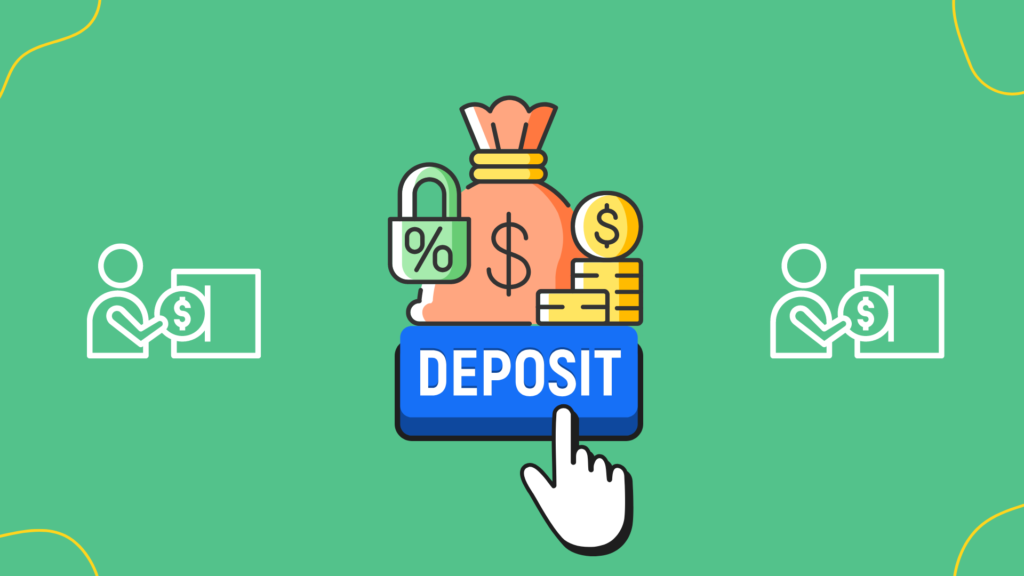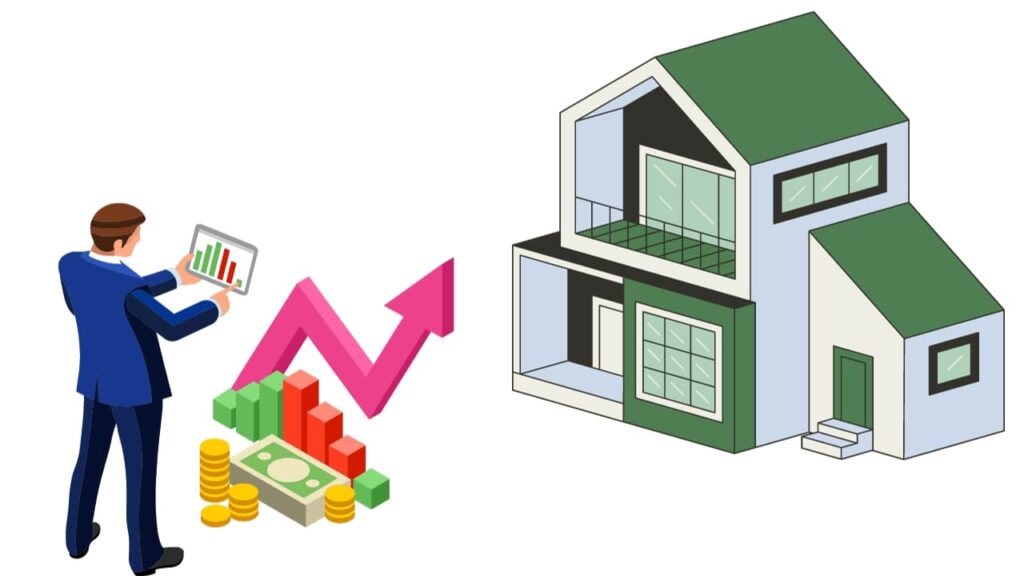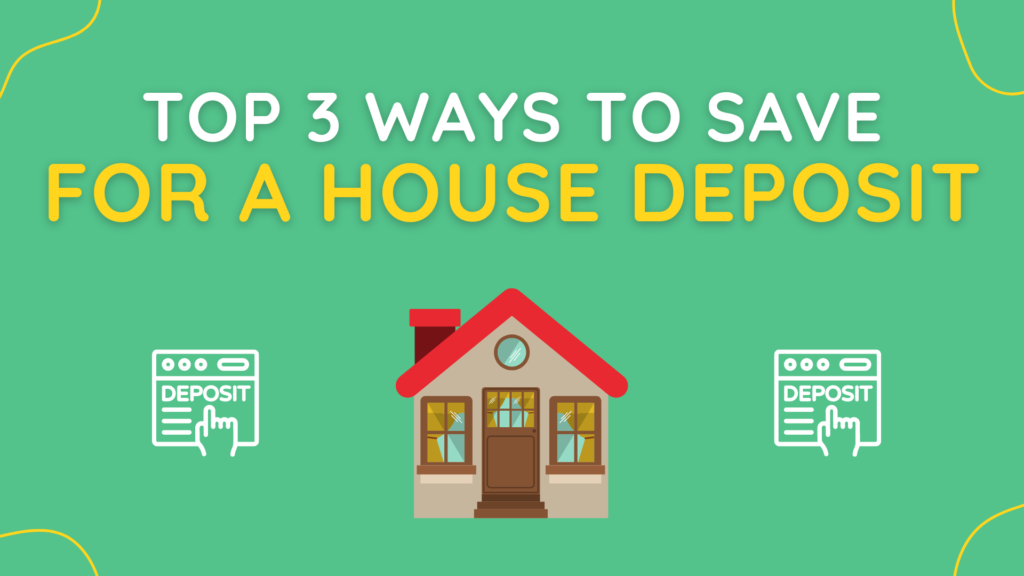
Sammie Ellard-King
I’m Sammie, a money expert and business owner passionate about helping you take control of your wallet. My mission with Up the Gains is to create a safe space to help improve your finances, cut your costs and make you feel good while doing it.
With soaring house prices, the cost of living crisis, and just about everything going wrong that possibly could, to then ask you to save for a house deposit, well, that’s no easy task. Fear not though!
We’re here to cut through all of the doom and gloom and to give you some top tips you need to save for a deposit.
Even just starting can look like a long road but if you break it down into smaller more achievable goals, it’ll help you stay the course.
Owning your own home is a big dream for many of us, but to get there you need some cold hard cash. That’s just facts!
How To Save For A House Deposit Quickly?
- Master your money flow: Budgeting is the bedrock of building your deposit.
- Maximise your means: Use ISAs and tech tools to transform savings into stepping stones.
- Slash and save: Cut expenses without cutting corners to fast-track your home-ownership journey.
Table of Contents
How To Save For A House Deposit?
Saving for a house deposit put simply is knowing the amount, breaking it down to a length of time and then actually doing the saving.
Saving for a house deposit off your own back is not easy. First time buyers attempting to get onto the property ladder alone are troopers – hats off to you! Keep going!
Started from the bottom now we hear type talk.
Many of us will get help along the way, but that doesn’t deny that it’s still a lot of money you need to find!
The best way to save for a house deposit is to break it down into bite-sized chunks.
First you need to look at affordability and then work out a percentage based on the potential property value.
So if the number is £10,000 for instance break it down into 10 – 1000s or 20 – 500s. That way you’ll know how much you need to save before you start thinking about how you’re going to save it.
Trust me this helps a lot.
Then you need to know how much you can actually contribute to your savings accounts which will likely affect the initial breakdown that you did. This is totally normal.
Contributing factors can be – saving on your own vs saving with a partner or family member because then that number gets smaller and more contributors often means faster and less for you.
And just remember property prices fluctuate and it’s likely to be a bit more expensive by the time you get there so factor that in too!

How long does it take to save for a house deposit?
Now, as we’ve said, owning your very own home is one of the biggest dreams that most people have.
Of course, dreams are worth waiting for. In this case, you’ll be waiting around eight years from when you start to pursue it!
That’s according to new data from Uswitch which shows the average first-time buyer is now 34 years old!
Something else that the same research has shown is that over half of these buyers found it almost impossible to save for a house deposit and are stuck paying rent.
They relied upon family to give them a helping hand, proving that the bank of mum and dad is still alive and well in places. Not everyone is quite so lucky though.
How Much Do I Need To Save For A House Deposit?
On average, aspiring homeowners in the UK aim to save around 10% of the property’s value for a house deposit.
However, some mortgage lenders may offer deals for as low as 5%, a threshold that was accessible with initiatives like the Help to Buy scheme, though this scheme is no longer available.
There are also 100% mortgage options which do not require a deposit, but these are rare and should be approached with caution.
Such deals may seem attractive, but they necessitate thorough due diligence and a clear understanding of the financial implications to ensure they are a prudent choice for your circumstances.
If you speak to a mortgage lender or mortgage broker then the bigger the deposit the better the deal you get.
Does it matter whereabouts in the UK I'm based?
It certainly does. With the average house price sitting at around the £240,000 mark, there are some significant regional variations.
As you’d probably expect, London is the toughest of places to get yourself on the housing ladder.
Here, if looking at a 10% deposit you’re going to need to save almost £48,000. If you need a 15% deposit that goes up to over £71,000.
Here’s a look at the different regions and what you’re likely to need as a deposit for each of them:
- North West – 10% deposit £12,962 / 15% deposit £19,444
- East Midlands – 10% deposit £14,926 / 15% deposit £22,390
- Yorkshire – 10% deposit £12,978 / 15% deposit £19,467
- West Midlands – 10% deposit £15,099 / 15% deposit £22,648
- South West – 10% deposit £20,254 / 15% deposit £30,381
- London – 10% deposit £47,757 / 15% deposit £71,635
- North East – 10% deposit £10,034 / 15% deposit £15,051
- East of England – 10% deposit £22,939 / 15% deposit £34,409
- South East – 10% deposit £25,035 / 15% deposit £37,553
The reality is that no matter where you’re looking at buying, you’re going to need a fair bit of money behind you to save a deposit and secure a mortgage.
How much can I get? Well, that’s a question you’d ask your mortgage advisor but you can also check out how the mortgage is calculated for you with our free mortgage calculator.
What we’re going to look at are the ways that you can earn extra, save more, and get better at budgeting.
Ready? Let’s get started.

1. Budgeting for a house deposit
Embarking on the journey towards owning a home starts with a solid budget.
It’s more than just a spreadsheet of expenses; it’s your blueprint for amassing the deposit that will unlock the door to your future home.
Understanding Your Financial Flow
Dive into the details of your monthly expenditures. Examine your bank statements and identify those seemingly inconsequential expenses—they all add up.
That morning latte might feel essential, but over a month, it could be a chunk of your savings gone.
Sammie’s hot tip 🌶️ – don’t focus on the lattes. What are the big costs like monthly subscriptions to the gym you’re never using or car insurance deals. Where can you make big moves for bigger savings?
Creating a Personalised Budget
With your spending habits laid bare, the next step is to tailor a budget that suits your lifestyle.
Don’t just guess where you can cut back—use budgeting tools to accurately categorise your spending and pinpoint where you can realistically reduce outgoings.
There are also some top budgeting apps which can help too.
Goal-Setting with Honesty
Setting ambitious savings goals is commendable, but unrealistic expectations can lead to disappointment.
Aim for a balance that allows for sensible saving while maintaining a quality of life that keeps you motivated.
Embrace the 50/30/20 Strategy
Many find success with the 50/30/20 rule, but it’s not one-size-fits-all. Maybe your ‘needs’ are lower, and you can afford to save more, or perhaps you’re in a season of life where ‘wants’ take precedence.
Tailor this framework to fit where you are right now, and adjust as you progress.
Savings on Autopilot
Nothing makes saving simpler than automation. By setting up a direct debit to your savings account, you make the decision to save once and reap the benefits every payday.
It’s like planting a tree; with little daily notice, it grows.
Sammie’s hot tip 🌶️ – Don’t download the app and cut up the card to this account. This will mean you’ll need to get onto the bank via phone or in branch. This is your house deposit money and it’s sacred!
A Budget that Breathes
Your budget isn’t set in stone. As your life evolves, so should your budget. Regular reviews are crucial. Did you get a pay rise?
Maybe it’s time to bump up the savings percentage. Found a way to reduce a monthly bill? Redirect that saving to your deposit fund.
The art of household budgeting is much like a dance—sometimes it’s slow and steady, and at other times, you can take bold steps forward.
But with each move, you’re drawing closer to the day you can call a house your own. Keep your eyes on the prize, and the rhythm of regular saving will get you there.
2. ISAs and Technology
You might be thinking how can I increase my savings with the cost of living current soaring.
You may want to use apps, or you may just want to hide it all under your mattress (not that we’d recommend the latter!).
There’s not a definitive answer to the best saving account for a house deposit as each person is different but we will explore three great options available to you.
Also be sure to check out our top money-saving apps.
Lifetime ISA (LISA)
A Lifetime ISA is a perfect way to save towards your mortgage deposit. Assuming that you are aged between 18 and 39, you can go ahead and open one of these.
There are numerous banks and organisations that offer Lifetime ISAs, with Nutmeg, Moneybox and Hargreaves Lansdown being amongst the most popular.
You can put away up to £4,000 a year with a LISA. What makes them so appealing is that the government will give you a 25% bonus every year.
This means that you could see an extra £1,000 coming your way each year. The money is tied into the account until you buy your first property so you need to be committed to getting onto the housing ladder when you open one.

Rounding up apps
In the days when we’d all pay cash for everything, what did you ever do with your change? Say you’d spent £1.80 and been given 20p change, where did it go?
While some people wouldn’t have a clue whatever happened to it all, others used to pop it into a special jar and save it. It was always amazing how quickly those loose coins could add up. Luckily, we can now get the same benefits with our card payments.
Providers such as Monzo and Moneybox allow you to pay with your card as you usually would. However, they will then round up your purchase.
Say you’d spent £2.70, they would round that up to £3. That extra 30p would be placed into a separate account where it grows. This is a modern twist on the age-old way of saving our change.
Check out some of the best savings apps here.
Autosaving
This one is a step beyond just rounding up your spending. The reality is that some of us, perhaps a fair few of us, aren’t too great at saving.
We have the best intentions but somehow, there’s always something else that we want to spend that money on. Autosaving can be a great way of breaking this habit.
Through the use of open banking, providers, such as Plum, can analyse your sending habits. This means that they can work out how much you can afford to save, either weekly or monthly.
Once they’ve identified the amount, they’ll deduct it automatically from your balance and put it into a savings account. You’re left with little choice but to save.
Plum is the award-wining ultimate smart money app, helping over 1 million people to invest, save and manage their spending with automation.
I'm personally using the app as part of my savings plan and absolutely love their automatic saving features.
3. Cutting Expenses
When saving for a house deposit, tightening the purse strings isn’t just about making sacrifices—it’s about making smarter choices. Let’s explore how you can trim the fat off your expenses without skimping on life’s joys.
Bills: Negotiate and Switch
Utility bills can be a goldmine for savings. Don’t settle for the price hikes from your providers. Haggling isn’t just for market stalls—it can also work with your energy, broadband, and mobile suppliers.
If your provider won’t budge on price, shop around. Switching providers can result in significant annual savings that can be redirected to your house deposit fund.
Subscriptions: The Silent Cash-Drainers
Subscriptions can drain your resources without you even noticing. It’s time to audit these monthly outgoings.
From streaming services to gym memberships, evaluate what you truly use and value. Cutting down on unused subscriptions can free up more money than you expect.
Cashback Apps: Save As You Spend
Turn spending into saving by using cashback apps and websites. When shopping for necessities, using these services can offer you a percentage back on your purchases.
Over time, this can add up to a considerable amount, all funnelled directly into your house deposit savings.
Check out some of the UKs cashback apps here.
Frugality: A Lifestyle Choice
Frugality isn’t about living with less; it’s about living with intent. Focus on value over cost. For instance, cooking at home can be both a delightful hobby and a way to cut down on eating out expenses.
Similarly, adopting a ‘fix it first’ mentality before replacing items can prevent unnecessary spending.
You could also look to move in with parents or friends so you don’t have to fully pay rent. A lot of people do this in but does mean you’ll need to stomach the in laws!
Mindset Shift: Quality Over Quantity
Lastly, adopt a quality-over-quantity mindset. It’s about making conscious decisions that align with your house-saving goals. Do you need the latest gadget on release, or can you wait?
Can you repurpose what you have instead of buying new? Every decision to not spend is money saved towards the place you’ll eventually call home.
By incorporating these strategies into your daily life, you’ll find that cutting expenses doesn’t mean cutting out fun. It’s about making thoughtful choices that bring you closer to owning your own home, one saved pound at a time.

Bonus - 4. Increase your Income
One great way to add to your house deposit fund is to earn a little or a lot extra. You’ll get there faster – it’s that simple.
The pandemic saw a huge increase in those looking into side hustles (ways to earn extra alongside their regular jobs) and these are the perfect way to raise funds that can go towards your deposit.
Here’s a look at three ideas to get you started:
Get blogging
Making money blogging has to be one of the best ways to earn additional income. With a blog, you get to write about what you love and get paid for it.
You may be wondering just how you get paid. Well, once you’ve got eyes on your content, you can start displaying ads and getting paid every time someone clicks on them.
You can also look at reviewing/endorsing other people’s products or services. If you do this and someone goes on to buy, you can earn a nice commission for yourself.
We started Up the Gains as a blog which has since grown into a brand solely to help others on their journey towards financial freedom.
It’s important to write about something you’re passionate about so the words don’t dry up after the first few posts.
Becoming a successful blogger takes time and dedication. We only started getting traffic to our blog after 5 months of consistent hustling but it can be done and be very lucrative if your niche is something people want to read about.
Take a look at Shopify
Have you ever wanted to set up your own e-commerce site but been baffled by the technical side of things? If so, Shopify may be the perfect solution for you.
This platform allows you to build a website, integrate payment methods, and add products in the most simple way possible.
You can sell practically anything online so if you’re good with crafts, paint or take great photos you could set up your own store.
Another great thing about making money on Shopify is that it’s perfect for dropshipping. This is a way of selling products without the need to hold stock, handle stock, or even post it. You sell the product and your dropship supplier takes care of everything else.
Be careful though it might just be worth selling your own products as dropshipping even though highly lucrative requires a few select skills like advertising and marketing.
Facebook Marketplace
Okay, so this way of boosting your house deposit funds may not be the most exciting, but it certainly works. It was once the case that if you wanted to sell anything unwanted, you’d probably turn to eBay.
The problem with eBay is that you’d end up incurring fees and losing out. Even if you could list for free, you’d still have a final fee based on the selling price as well as another one from PayPal for processing the payment.
The great thing about Facebook Marketplace is that you can sell all of the same kinds of things but without the fees.
Roundup
In conclusion, the journey to accumulate a house deposit can be as unique as your dream home itself.
By embracing budgeting, exploring ISAs and support options, cutting expenses, and finding ways to increase your income, you’re employing the best way to save for a house.
Remember, understanding how to save money for a house is a skill that comes with practice and patience.
Whether it’s the steady approach of setting aside savings each month, the shrewd review of your regular outgoings, or the savvy pursuit of additional income streams, you’re paving a path towards your goal.
The easiest way to save for a house deposit is to combine these strategies with a lifestyle that prioritises saving without sacrificing the zest of life.
With each step, you’re not just saving money; you’re building the foundations of your future. So stay the course, keep your eyes on the prize, and soon you’ll be turning the key in the door of your very own home.
MORE LIKE THIS
Share on social media
Disclaimer: Content on this page is for informational purposes and does not constitute financial advice. Always do your own research before making a financially related decision.



